Dental Implants – Louisville, KY
Replace Missing Teeth with a Seamless, Lasting Solution

When it comes to replacing lost teeth, there are several options available today – but none look or feel as lifelike as dental implants. While traditional options like dentures or dental bridges only bother with replicating the crown (the white portion) of the tooth, dental implants rebuild the entire structure. This enables them to keep the patient’s jawbone healthy and ensure a solid, permanent fit that feels completely natural. At Bell Dental, Dr. Kenneth Bell and Dr. Steven Kaebnick are happy to offer the entire dental implant process here in-office for a more comfortable, streamlined experience overall. Contact our office today to schedule a consultation for dental implants in Louisville, KY!
Why Choose Bell Dental for Dental Implants?
- Entire Dental Implant Treatment Completed Under One Roof
- Affordable In-House Dental Financing Available
- Modern Dental Technology for Smoother, More Comfortable Treatment
What Are Dental Implants?
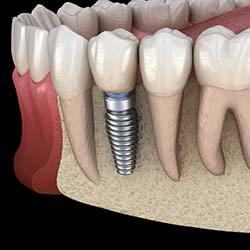
A dental implant refers to an artificial root meant to take the place of a missing tooth. Made from titanium or other biocompatible materials, dental implants merge with your natural bone tissue after being surgically positioned in your jaw. At that point, they’re able to provide a sturdy, long-lasting foundation for a personalized dental crown, bridge, or denture, depending on the number of teeth you’re missing. Unlike conventional options that merely sit on top of the gums, dental implants recreate every part of the lost tooth, which is why they’re virtually indistinguishable from the genuine article!
4 Step Dental Implant Process
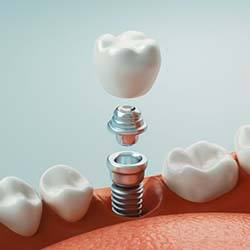
Unlike other tooth-replacement options, like dentures, dental implants replace the entire structure of a missing tooth, from root to crown. As a result, the treatment process is a bit more extensive, taking anywhere from a few months to an entire year to complete. The good news is that your new and improved tooth is designed to last for a lifetime with proper care, which makes the investment of your time upfront well worth it. While the best way to find out the exact timeline and process is by scheduling an initial consultation, you can read on to learn all about the four main steps!
Initial Dental Implant Consultation

Whether you are missing one tooth or an entire arch of teeth, the first step is always the same: scheduling an initial consultation. During this visit, we can determine if any preliminary treatments are needed, like a tooth extraction or gum disease therapy. After all, serious dental problems – from tooth decay to inadequate jawbone density – can increase your chances of dental implant failure in the short and long-term. For this reason, our skilled dentists will address those problems first and foremost. Once your oral health is in pristine condition, we’ll create a custom treatment plan designed to complete your smile. Don’t worry – before scheduling your subsequent appointments, we will review all of the details, including the cost and the treatment timeline.
Dental Implant Surgery

Our family-owned dental practice is well known for our quality services, friendly care, and state-of-the-art treatment. After meeting our team and experiencing the truly exceptional dental experience you deserve, the last thing you want is to have to leave to visit a specialist you barely know. Fortunately, we’re happy to personally handle your procedure in a convenient and friendly environment you’re already familiar with.
When it comes time for your dental implant surgery, the details will depend on your dental needs, like how many dental implants you need to restore your smile. Whether your tooth loss is mild or severe, the first step is for our skilled Louisville dentist to make a small incision in your gums. Once they’ve accessed the jawbone, they will insert the dental implant into the pre-planned area. From there, they will close up your gums, place a protective cap over the implant post, and send you home to start recovering.
Dental Implant Osseointegration & Abutment Placement
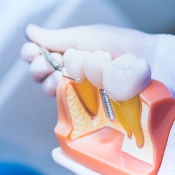
While you’re recovering, an important process called osseointegration is taking place underneath your gumline. Essentially, this is the fusion of your dental implant post to your jawbone, which is vital to the strength, durability, and longevity this state-of-the-art tooth-replacement option is known for. In most cases, this process takes around 4-6 months.
When it’s time, you’ll return to our office for the next step of the procedure: attaching the abutments. This connector piece may be small, but it is responsible for holding your new teeth perfectly in place. The last step in this part of the process is taking the necessary impressions so we can get to work on making your custom-made restoration.
Delivery of Dental Implant Restoration(s)

The last and final step is to return to our office to have the restoration placed. Anchoring your new crown, bridge, or denture on top of the implant post will seamlessly restore the visible portion of your tooth, allowing you to smile confidently and chew pain-free again. Once we’ve double-checked that you can bite down comfortably, we will anchor the restoration in place permanently, allowing you to walk out of our office with a new and improved smile!
Benefits of Dental Implants

Choosing the right method of tooth replacement shouldn’t leave you feeling stressed or overwhelmed. While there are certain factors to consider, including cost and timeframe, you must also look at the other benefits that can come with a particular method of treatment. When comparing your options, the benefits of dental implants in Louisville stand high above the rest. Dentures and fixed bridges cannot come close to matching the superiority of these durable, reliable, and longer-lasting prosthetics. It’s no wonder more than three million people are already enjoying their new smiles thanks to dental implants. To learn more about their many advantages, check out the list below.
Day-to-Day Benefits

- Unlike dentures that can leave you feeling embarrassed because of accidental slippage or an unnatural appearance, your dental implants will have you embracing a better quality of life. You’ll look forward to visiting with friends and family again because of your renewed confidence.
- With dentures, the acrylic base can become warped from intense cold or hot temperatures. Not to mention, the artificial teeth can crack when eating certain foods. Dental implants give you the freedom to eat and drink whatever you like. Hard, crunchy foods and hot beverages are not a problem with these durable and high-quality prosthetics.
- You’ll enjoy a greater bite force and chewing power with dental implants in Louisville.
- Unlike fixed bridges that are placed over your natural teeth and dentures that require your natural suction to remain in place, dental implants are permanently fixed to your jawbone. This ensures a more durable and structurally sound foundation for your customized restoration. This will make it easier to eat without worrying about your prosthetics slipping or falling out.
Health Benefits
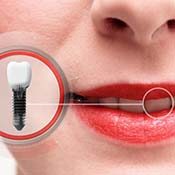
- The number of teeth you have and your lifespan are actually linked. By replacing your missing teeth, you can help to improve longevity and enjoy your new smile for longer.
- You’ll never need to worry about your implants irritating your gums, lips, cheeks, or tongue, as they are surgically placed. Dental implants mimic the natural tooth structure, so you should experience no discomfort once you’re fully healed from surgery.
- You’ll enjoy a more youthful appearance because of your implant’s ability to stimulate the jawbone. This is a benefit that cannot be matched with any other solution. Your implant dentist in Louisville places the implants into your jawbone, allowing them to provide stimulation and avoid potential facial collapse.
- Dentures and fixed bridges can leave you vulnerable to bacteria and potential gum disease because of the difficulties that can come with cleaning them. Fortunately, dental implants are easy to clean and require no special solutions or instruments. You can clean them just like you do your regular teeth.
Long-Term Benefits

- You’ll be pleased to learn that after 10 years, there is still a 90% to 95% success rate with dental implants.
- Your implants are designed to last a lifetime with regular care and maintenance. While the restoration will likely need to be replaced over time, the posts can remain firmly in place for the remainder of your life. Dentures and fixed bridges, however, must be replaced every few years, which can become costly.
- You won’t need to bother with denture adhesives, cleaning solutions, or money spent on relining or replacing your prosthetics.
Who Dental Implants Can Help

Not only are dental implants the premiere tooth loss solution, but they can replace any number of missing teeth. If you’re missing one tooth, and entire arch, or any number in between, we can create a custom dental implant treatment plan to rebuild your smile. What’s more, practically any healthy adult can benefit from this fantastic tooth replacement option! To learn more about if dental implants are right for you, keep reading.
Who Is a Good Candidate for Dental Implants?

Are you the right candidate for dental implants? Most people are, but there are some important characteristics that must be met to maximize the chances of a successful treatment. During your consultation, we’ll discuss what it takes to be a good candidate for dental implants. Generally, you’ll need:
- A strong jawbone – Adequate jawbone density is essential for the long-term success of dental implants.
- Good oral health – Issues like tooth decay and gum disease can cause dental implants to fail.
- A commitment to good oral hygiene – Once an implant is in place, it’s very important that you practice great oral hygiene and break bad habits like smoking.
If these conditions aren’t met, there’s no need to worry! In fact, many patients don’t qualify for dental implants initially. However, preliminary treatments like gum disease treatment and bone grafting may be able to help you overcome whatever is standing between you and your new smile! Once you’ve been given the green light, we’ll work with you to create your treatment plan. The number of implants and type of restoration you’ll need will largely depend on how many teeth you’re missing.
Missing One Tooth
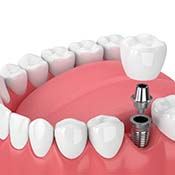
One dental implant paired with a custom crown is an excellent way to rebuild a single missing tooth. The dental implant can be placed into the jawbone where the missing tooth’s roots once were, and the crown it supports will fit flawlessly into the rest of your smile. Unlike a traditional dental bridge, a dental implant won’t require altering any healthy neighboring teeth!
Missing Multiple Teeth
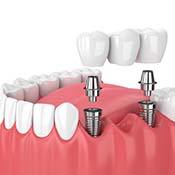
When replacing multiple teeth, it’s unlikely that you’ll need to have a dedicated implant for each tooth you replace. In some cases, a single implant can hold a two-crown bridge. For three or more missing teeth, a pair of implants can typically hold a larger bridge, helping you save time and money on treatment. For missing teeth scattered around the mouth, we can place a few dental implants to secure a partial denture.
Missing All Teeth
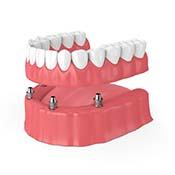
When faced with multiple implants and a more extensive area in need of reconstruction, individual dental crowns can quickly become too involved and costly. Thankfully, implant dentures are available to provide quality coverage at an affordable price. These appliances are very similar in appearance to traditional dentures, but they are anchored into place with dental implants instead of suction, creating a much more solid fit that feels natural. Depending on your level of oral health and personal preference, we’ll recommend either a fixed or removable option.
Understanding the Cost of Dental Implants

Are you curious about the price of dental implants? One of our most popular treatment options, dental implants restore teeth from the roots up for unmatched results. They bring our patients many other benefits, however they tend to come with a higher price tag than other options. This is because they are considered a long-term investment with many unique factors that influence the final cost. Read on to learn more about the cost of dental implants and why they’re worth it!
Preliminary Treatments & Dental Implant Surgery

There are multiple stages that make up the implant process and each step will incur a separate cost that adds up to the total treatment price. First, you’ll have your initial consultation, which is followed by treatment of any preexisting dental issues. For example, we may perform gum disease therapy or tooth extractions if necessary, leading to an increased cost.
Furthermore, surgery and the anesthesia that comes with it have their own cost. Thankfully, our dentists are trained to perform the entire surgery in-house, making your fees more compact, convenient, and easier to understand overall compared to visiting an oral surgeon at another office.
The Parts of Your Dental Implant
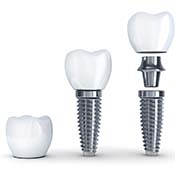
There are various types of dental implants and the solution you need will directly depend on the number of teeth you’re missing. As you can imagine, the more teeth you’re missing, the higher your treatment cost will be in most cases. However, other factors that can influence your final price tag include the materials used to make your implants, such as titanium or zirconia, and the manufacturer and brand of the implants used. We’re happy to be upfront and transparent about these factors and break down exactly why we opt for them over other options.
Final Dental Implant Restoration

Once your implants are fused to your jaw, and your abutments have been attached, we will mount your custom-made restorations on top of your implants. These restorations could be simple like a dental crown or more complex like a bridge. The most expensive varieties are implant dentures, which can be customized to be full or partial depending on your needs. We’ll make sure you know well in advance which restoration is needed to make your smile complete.
Does My Dental Insurance Cover Dental Implants?

Dental implants are usually not covered by dental insurance. However, your plan may be able to help out with some of the costs associated with the entire process. Your initial consultation, treatment of preexisting issues, and part of your restorations are just some examples of portions of the procedure your insurance may be able to cover. Our friendly front desk staff will do all they can to maximize your insurance benefits to help you pay less out of pocket.
Making Dental Implants Affordable

We also have alternative financing options to make our quality dentistry affordable for all budgets. For example, we gladly accept CareCredit financing. This third-party option allows patients to pay for dental services over the span of several months, rather than all in one single payment. On top of that, these payments come with little to zero interest attached depending on the plan you choose.
Alternatively, our practice offers a Dental Membership Plan that gives you discounts on many other services, including dental implants. In fact, after you sign up, you’ll gain a $500 credit that specifically goes toward your dental implant treatment!
Advanced Dental Implant Procedures

Just because you may not be able to get dental implants right away, it doesn’t mean that you’re not a good candidate for the treatment. Many patients we see have been living with traditional prosthetics or missing teeth for years, if not decades. In these cases, it may be necessary to fortify and strengthen the jawbone so the dental implants will have a stable and sturdy foundation to fuse with.
Not only will an advanced dental implant procedure in Louisville improve the longevity of your new teeth, but it can help make you an ideal candidate for the entire process. Our team will discuss whether you require any advanced preparatory treatments with you during your consultation, so you know exactly what to expect.
Bone Grafting
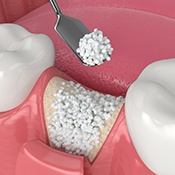
Once teeth go missing, the roots are no longer stimulating the jawbone beneath the gumline to provide the area with necessary blood flow and support to help it retain its density. As a result, the bone can deteriorate over time because the body no longer detects a need for it. Whether you have a gap in your smile or utilize a dental bridge or traditional denture, this breakdown can occur.
One of the most important parts of the dental implant process is osseointegration when the implant fuses with the jawbone. This provides your future prosthetic with strength and a firm foundation. When the bone isn’t dense enough, this can keep osseointegration from occurring and cause your implants to fail. To prevent this from happening, our team can use bone grafting in Louisville to add volume to the jaw in areas where bone loss has occurred.
Ridge Expansion
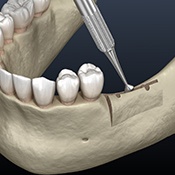
The alveolar ridge of your jaw is the bone structure surrounding the roots of your teeth. If a tooth has fallen out or been removed, an empty socket is left in the ridge bone, eventually healing on its own by filling with bone tissue. As you age, or due to issues like gum disease, this supportive structure can begin breaking down and losing density, causing the bone to collapse around the socket and the ridge to narrow. When this occurs, it no longer has enough room for an implant.
A ridge expansion is a surgical procedure that allows our team to widen the alveolar ridge to support the implant posts and increase the success rate when you get dental implants in Louisville. The inner and outer segments of the ridge are divided, allowing space for bone graft placement to expand the area.
Dental Implant Failure & Salvage

We always double-check to ensure that we’ve maximized your chances of success before we place dental implants, but we’re also ready to help if a problem happens to occur after your implant surgery. Whether you have an infection that must be treated or are suffering from an injury that has caused the implant posts to come loose, we’re here to figure out what your smile needs and solve the underlying issues that led to implant failure.
Learn MoreDental Implants Post-Op Instructions

At Bell Dental, our team is specially trained in placing dental implants, meaning we can complete the entire process from start to finish in one convenient location. To ensure you make a smooth recovery, we’ll provide you with post-op instructions directly following your surgery. Should you have any questions or concerns during your recovery, don’t hesitate to contact us for assistance. Below, we’ve included some dental implant post-op instructions in Louisville to help you navigate the healing period.
What to Do Directly After Dental Implant Surgery

Dental implant surgery is certainly one of the most taxing parts of the entire process. However, you can expect a speedy, comfortable recovery with proper care and maintenance. By following our dentist’s aftercare instructions diligently, you’ll be one step closer to having a fully restored smile!
While you recover after getting dental implants in Louisville, it’s crucial you leave the blood clot on your surgery site untouched. To do this, be sure to avoid:
- Spitting (use tissues or swallow your saliva)
- Drinking from a straw
- Smoking or using tobacco products
- Touching the surgical site with your tongue or fingers
Common Side Effects

Have you ever had oral surgery before? If not, you’re probably unsure which symptoms are considered normal and which aren’t. Fortunately, knowing what to expect can help you better understand when you should be seeking help.
That said, here’s what you will experience in the first few days following your procedure:
- Intermittent Bleeding – You can control your bleeding by placing clean gauze over the area and applying light pressure. It can continue for several days after your surgery.
- Swelling – This can occur for 72 hours following your procedure, sometimes even over a week. You can reduce swelling by using a cold compress on the outside of your cheek over the area where you feel pain.
- General Discomfort – Although you will experience discomfort as you heal, it should gradually fade over time. You can relieve it by taking prescribed or over-the-counter pain medication.
Diet

It’s best to stick to a soft-food diet for the first few days following your procedure. With that in mind, here are some foods you should stock up on before your surgery:
- Mashed potatoes
- Yogurt
- Ice cream
- Pudding
- Soup (but not too hot!)
- Scrambled eggs
- Pasta
You can return to a normal diet as soon as you feel up to it. However, you’ll still want to exercise caution around crunchy or tough foods and avoid chewing directly on the implant site.
Health & Oral Hygiene

It’s incredibly important to take proper care of your teeth and gums after dental implant surgery to avoid complications. When you brush your teeth, do it as you normally would but be careful around the surgical site. You’ll also want to rinse with warm salt water 2-3 times a day and after each meal. Avoid using any mouthwash that contains a high level of alcohol, as it can irritate your oral tissues or dry out your mouth.
What to Do After Your New Teeth Are Attached

Once you’re healed and the implants have successfully fused with your jawbone, you’ll return to the office for the final step. Our implant dentist in Louisville will place your restoration (crown, bridge, or denture) and complete your smile. If you experience mild sensitivity or discomfort after this step, you can manage it with a prescription or over-the-counter pain medication. If you experience bleeding or swelling, contact our team right away – those aren’t normal side effects after restoration attachment.
Maintaining & Caring for Your Dental Implants

Dental implants are designed to provide a durable, lifelike, and long-lasting solution for restoring your smile. While they can be expected to go as far as several decades to a lifetime, they will only work if you take proper care of them. Fortunately, this is a much simpler task compared to other traditional tooth replacement options. Here’s a breakdown of several tasks you’ll want to implement for dental implant care in Louisville to make the most of your new pearly whites.
Make Oral Hygiene a Priority

Although dental implants can’t develop cavities, it doesn’t mean the rest of your teeth, gums, and jawbone aren’t susceptible. By regularly cleaning your mouth of debris, food particles, bacteria, and plaque, you’ll help maintain strong and healthy connective tissues. This will ensure that your metal posts remain sturdy and secure in the long term. Make sure to brush twice a day for two full minutes, floss daily or after every meal, and rinse frequently with mouthwash.
Eat a Healthy Diet

Unlike traditional restorations like dental bridges and dentures, you’ll be able to regain around 80% or more of your natural biting power with dental implants. This means you can enjoy all your favorite foods without many dietary restrictions. That said, you might want to consider the kinds of meals you choose, as some treats can lead to problems for your implants and oral health. Minimize your sugar intake to avoid cavities or infection and refrain from overindulging in hard or sticky foods to prevent damaging your new teeth. Try picking foods packed with vitamin C and calcium to encourage healthier bone tissue for your dental implants.
Break Bad Oral Habits

Even if you stick to a solid oral hygiene routine and a well-balanced diet, a few poor habits can significantly reduce the longevity of your restorations. Once you receive your dental implants, you’ll want to make the most of them by breaking off bad oral habits, including:
- Smoking - This can interfere with osseointegration and make your teeth vulnerable to infection, increasing the risk of dental implant failure.
- Using your teeth as tools – Whether this is to cut your nails, open containers, or hold grocery bags, doing this can easily chip or otherwise damage your restorations or natural teeth.
- Chewing on hard objects – Biting on hard items like fingernails, pen caps, and ice can quickly wear down the surface of your dental implants.
Protect Your Dental Implants

If you tend to play sports where there’s a risk of taking a blow to the face, then you should consider investing in custom athletic mouthguards from your dentist. These will provide a cushion for your smile and protect your implants from getting damaged. If you often grind your teeth while sleeping, you can end up wearing them down over time, loosening your implants in the process. Ask your dentist about nightguards for bruxism for the necessary protection.
Schedule Regular Dental Checkups

Your dentist is your greatest ally when it comes to preserving your dental implants. By visiting them every six months for dental checkups, they can monitor the integrity of your metal posts and address any developing oral health issues they might detect. This way you can maintain a healthy smile while also avoiding any future complications like gum disease or infection!
Dental Implant FAQs

If you still have questions about dental implants, we have the answers! Before making an investment in your oral health and quality of life, it’s important to have the details you need to make an informed decision. That’s why we’ve included the answers to some of the most frequently asked questions about dental implants and the process of receiving them.
Are All Dental Implants the Same?
There are different types of implants that are designed based on the number of teeth that need to be restored. For example, if you’re missing multiple consecutive teeth, we can use an implant bridge to literally “bridge” the gap in your smile. This replacement is composed of a dental implant on either side for support that is mounted with a custom-made prosthetic. The type of implant that you need may also depend on the condition of your oral health. Some parts of your jaw may be too weak for implants, which can also influence the type of replacement that we recommend.
How Many Dental Implants Will I Need?
The number of implants that you need will directly depend on how many teeth you’re missing. One of the benefits of dental implants is that they can be used to replace one tooth, multiple teeth, or even entire smiles. If you’re missing one tooth, you will typically only need one dental implant to support a custom-made crown. However, bigger teeth like molars may require two dental implants to properly support a larger restoration. On the other hand, someone that needs their entire arch replaced may only need four dental implants to support their denture. We will examine your mouth before recommending the right number of implants for your smile.
Is the Dental Implant Procedure Painful?
Many people hear about what the dental implant process actually entails and automatically assume that it’s painful. However, in reality, patients who receive dental implants tend to compare any possible discomfort they felt during surgery to a simple extraction. We offer sedation to ensure that you’re relaxed, and we’ll numb you before beginning. Additionally, your jawbone doesn’t have pain-sensing nerves, which makes your surgery much more comfortable than you may think. The only type of discomfort that patients feel is slight soreness during the first few days after surgery.
Am I Too Old or Young to Get Dental Implants?
You’ll be happy to hear that there is no upper limit for getting dental implants! As long as you’re in good oral health, or you’re willing to undergo any necessary preliminary procedures such as a bone graft, you’re never too old to replace your lost teeth with implants. However, we typically don’t recommend them as an option for teens under the age of 18; implants are only effective if the patient’s jawbone has finished developing since.
Can I Get Dental Implants If I Smoke?
Patients who smoke are at a significantly heightened chance of experiencing dental implant failure. Smoking cigarettes and using tobacco products causes dry mouth, inhibits the body’s natural healing capabilities, and can interfere with osseointegration, the process by which the implant posts fuse with the patient’s jawbone. Smoking can also cause dry sockets, which occur when the blood clot that forms over the socket to assist with healing is dislodged, resulting in considerable pain. Smokers that plan to get dental implants should aim to quit at least two weeks before the procedure and wait to resume the habit for at least a few months afterward—of course, this is also a great opportunity to simply kick the habit for good!
Is There Anything I Shouldn’t Eat with Dental Implants?
While it’s true that dental implants perfectly replicate your teeth and restore your chewing power, when you first get them, you should avoid particularly hard or crunchy foods for a while. This means sticking to soft foods at first; though, don’t use a straw if you’re enjoying smoothies and milkshakes, as the suction can dislodge your blood clots and lead to painful dry sockets! However, once your mouth has healed up, you can chow down on almost anything you’d be able to eat with your natural teeth! Some foods like chewy or sticky candy, or even nuts and ice, can still loosen, damage, or dislodge your implants, so it’s always wise to show caution.
Will People Be Able to Tell That I Have Dental Implants?
People won’t be able to tell that you have dental implants unless you tell them! One of the coolest things about dental implants is that they fully recreate your original teeth in terms of look, feel, and functionality. The restoration that’s secured on top of the posts is crafted from precise impressions of your mouth and the highest quality materials available, ensuring that it beautifully resembles your natural teeth.
